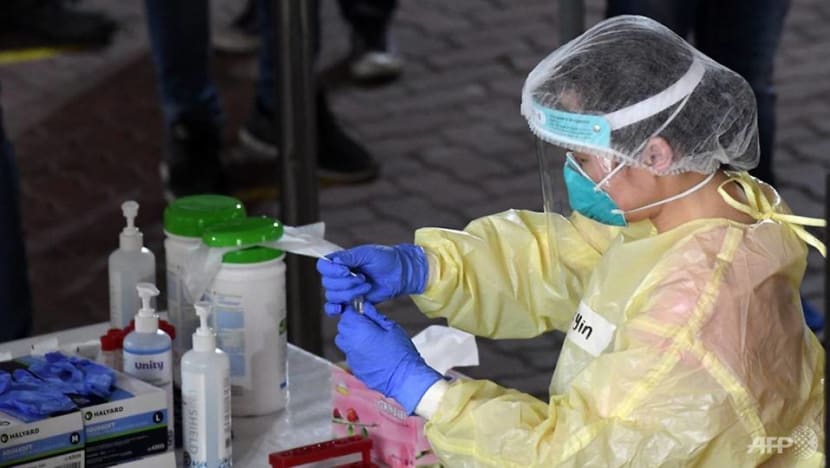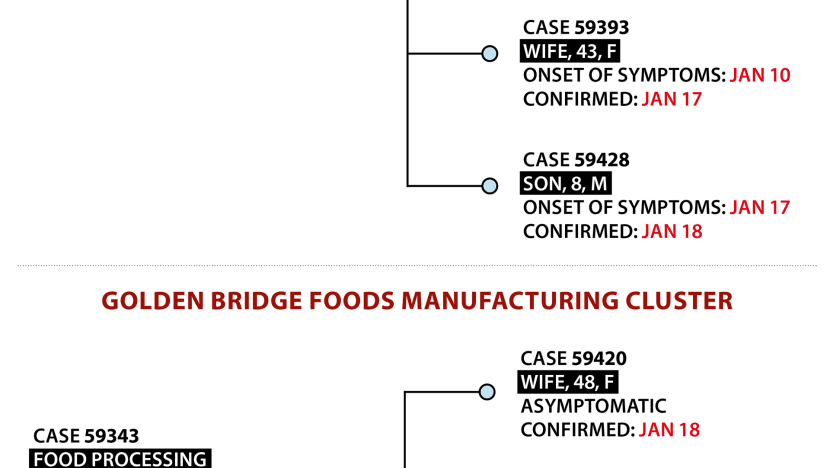COVID-19: Patients with mild symptoms may hesitate to see a doctor; experts urge public to be vigilant

File photo of a health worker preparing to take a COVID-19 nasal swab test sample in Singapore, Jun 10, 2020. (File photo: AFP/Roslan Rahman)
SINGAPORE: Many who fall sick with milder respiratory symptoms may hesitate to see a doctor immediately because they are not sure if they are really ill, said doctors and experts.
“It's quite common for someone in the early phase of symptom onset to be unsure whether it’s the start of a cold or whether it’s just, say, a dry throat from being a bit dehydrated,” said vice-dean of research at the National University of Singapore (NUS) Associate Professor Alex Cook.
“What would trigger me to check it out would be if I had multiple symptoms, so it’s probably an infection and not fatigue or something, or if the symptom persisted longer than a day or two. In that case, it’s important to go get it checked out.”
This comes after it was revealed that several cases linked to the police para-veterinarian at the K-9 unit, or the Case 59280 cluster, had developed possible COVID-19 symptoms but had not sought medical treatment.
On Sunday (Jan 17), the Ministry of Health (MOH) said that Case 59365, a 44-year-old male Singaporean, an administrative officer who works at the same location as the police para-vet developed a dry throat on Jan 7 but had not sought medical treatment.
A 44-year-old female Singaporean who is a family member of the administrative officer also developed a fever and chills on Jan 9, and subsequently loss of smell and taste on Jan 13, but had also not sought medical treatment.
Another two cases related to the cluster announced on Monday - the spouse and another family member of the administrative officer - had also developed symptoms, including a loss of taste, respiratory symptoms and diarrhoea, but did not seek medical treatment.
On Tuesday, MOH reported an 8-year-old male Singaporean - the child of the administrative officer and his spouse - tested positive for COVID-19, after developing a fever while in quarantine. The primary school student is the seventh person linked to the K-9 unit cluster.
Two cases reported on Wednesday had continued to go to work despite being ill with symptoms like sore throat, difficulty breathing and loss of smell and taste. They were part of a new workplace cluster involving four colleagues.
"We strongly urge everyone to do their part to reduce the risk of transmission. Those who are unwell, including those showing early/mild symptoms, should be socially responsible and seek medical attention immediately," said MOH on Tuesday.
READ: What we know so far about the COVID-19 cluster linked to the police para-vet
SOME PATIENTS STILL FEEL WELL
Doctors and experts CNA spoke to said that many patients with mild symptoms may not want to see a doctor just yet because they still feel well and do not want to be exposed to sick people at the clinic.
“It takes effort to make an appointment, travel there and wait. Another reason is lack of awareness, some may think that people with COVID-19 should have fever with cough at least,” said Dr Ling Li Min, an infectious diseases physician at the Rophi Clinic.
In general, patients with mild acute respiratory infection symptoms often do not visit the doctor immediately, said Dr John Cheng, head of primary care at Healthway Medical Group.
“Even in pre-pandemic times, many prefer to monitor their conditions at home first before heading to the clinic,” he said.
“Right now, there are various reasons as to why some patients may delay seeking medical help. Some reasons include the fear of taking a PCR (polymerase chain reaction) test, the inconvenience posed by the five-day MC, or even simply to avoid going to the clinic for minor illnesses to reduce the risk of exposure.”
But there are also patients who visit clinics immediately when they feel ill as they would rather not risk developing a more severe infection or infect their loved ones, said Dr Cheng.
NUS's Assoc Prof Cook told CNA: “Outside of the pandemic, it’s not unusual to ‘tahan’ mild colds or flus, to use folk remedies or over-the-counter medication, and wait for it to resolve by itself, which most respiratory infections do.”
Making masks mandatory and symptom screening at companies reduces the risk from people who are asymptomatic or paucisymptomatic - exhibiting a few symptoms - but continue their day to day lives, he added.
“Obviously it’s better to reduce your activity if you know you have a symptom of cold or flu but haven’t yet gone to the doctor," said Assoc Prof Cook.
The symptoms may also be similar to regular allergies or other non-infectious causes of cough, sore throat or running nose, said president of the Asia Pacific Society of Clinical Microbiology and Infection Paul Tambyah.
"That is why it is best to go to the same GP or have a regular doc who will know if you are someone with a tendency for allergic rhinitis or some other cause for the symptoms."
Medical leave entitlements are also a worry for patients with mild symptoms, said Dr Lim Kim Show, a family physician at Life Family Clinic.
"Some of them would not want to get extended medical leave because that may actually affect the medical leave entitlement for the year,” he added.
Noting that for patients who present with mild acute respiratory infection symptoms and are asked to take the swab test, Dr Lim said doctors will issue medical leave of three to five days to ensure the patients get enough rest and to wait for the results of the swab test.
“So that three to five days of medical leave actually do affect the decision of some patients not to come forward at the first instinct of having any respiratory symptoms,” he added.

READ: COVID-19: Pilot to reopen nightclubs, karaoke outlets delayed amid rise in community cases
STAY VIGILANT AND SEE A DOCTOR
While many with mild symptoms might hesitate to visit a doctor, experts and doctors urged individuals to stay vigilant and go for a check-up if symptoms do arise.
“I’m quite sure that, right now, most people with mild cold or flu symptoms do not actually have COVID-19, but some other infection,” said Assoc Prof Cook.
“However, the risk is there, as in the police admin officer’s case, and while most mild COVID-19 infections will resolve on their own, there’s a real and substantial risk that it might spread to someone vulnerable who could be much more seriously ill.”
It can be "tricky" to decide when to see a doctor when the patient has non-specific symptoms, said Dr Tambyah.
For example, if the patient has any links to or is working in a high-risk profession in contact with travellers, they should take minor symptoms a bit more seriously and see their regular general practitioner who can make an assessment based on examination and the patient's history, he added.
"I think that the best approach is to rest for a day and if not better the following day, see a doctor. Of course, if one works for a company which requires an MC for even a day of rest, then there is no choice but to see the doctor on the first day and potentially get a swab and a three-day SHN (stay-home notice)."
“I would urge people even with mild symptoms to be tested straight away. We clearly have a problem and now is the time to stamp it out,” said Professor Dale Fisher, senior consultant at NUH and Chair of the WHO Global Outbreak Alert and Response Network.
If an individual tests positive, this gives contact tracers a chance to find any other cases, he said, adding that unlinked community cases are “very dangerous” and need to be found quickly.
“Of course most people aren’t very sick so it’s easy just to rest. But in the interests of not allowing COVID-19 to pick up again in Singapore, then being diagnosed is crucial,” said Prof Fisher.
“I know most of us would not like the isolation if found to be positive but it really is for the community good. I think it’s a critical point at the moment.”
Individuals should look out for symptoms including fever, cough, sore throat, body aches, pains, loss of taste or smell, runny nose, said Dr Ling. They may also have nausea, vomiting or diarrhoea.
“The message is any acute respiratory symptom with or without fever, regardless of severity, (they should) see a doctor,” he added.
A loss of taste and smell are “characteristic symptoms” of COVID-19, since these do not usually occur with other viruses, said Assoc Prof Cook.
“But it’s important to remember you don’t have to have one of those hallmark symptoms for it to be COVID-19: The symptom profile overlaps a lot with that of influenza or common cold viruses, so the only way to be sure is through a test.”
Additional reporting by Soon Wei Lin.
BOOKMARK THIS: Our comprehensive coverage of the coronavirus outbreak and its developments
Download our app or subscribe to our Telegram channel for the latest updates on the coronavirus outbreak: https://cna.asia/telegram














